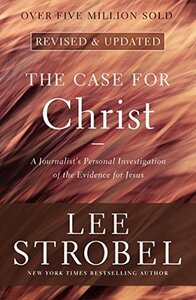Take a photo of a barcode or cover
402 reviews for:
The Case for Christ: A Journalist's Personal Investigation of the Evidence for Jesus
Lee Strobel
402 reviews for:
The Case for Christ: A Journalist's Personal Investigation of the Evidence for Jesus
Lee Strobel
challenging
informative
reflective
medium-paced
Quoting David Fitzgerald, “he [Lee Strobel] is selling them spiritual junk food, just as hollow as a chocolate Easter bunny.”
Misogynistic, anti-Semitic, racist, sacrilegious, and blasphemous. No logic. Strobel was a Christian before writing this book and claimed to be an atheist. Lying/hypocrite.
Comfort food for the already devout. Don’t waste your time reading this.
Misogynistic, anti-Semitic, racist, sacrilegious, and blasphemous. No logic. Strobel was a Christian before writing this book and claimed to be an atheist. Lying/hypocrite.
Comfort food for the already devout. Don’t waste your time reading this.
challenging
informative
reflective
slow-paced
This was a well researched and interesting book. Each of the interviews was thoughtful and thorough.
challenging
emotional
hopeful
informative
inspiring
reflective
medium-paced
challenging
informative
inspiring
reflective
medium-paced
challenging
informative
inspiring
medium-paced
informative
reflective
medium-paced
A professor recommended this book to me over a decade ago, and I’ve finally read it. It’s very well-constructed and sincere, and it provides a solid introduction to practical apologetics for Christians and non-believers alike. He’s occasionally heavy-handed, and mature Christians are likely familiar with several parts, but there is likely new information and new insights
Stopped reading after a few chapters. It was well-written and interesting, but I felt like I should rely more on my faith than technical details proving things I already know to be true
informative
reflective
medium-paced
I'm glad this book has had the impact it has. I can't say I found it terribly helpful though, either for my own research, or as a book I'd be likely to recommend to others. For myself, the book seemed to skim the surface a lot, and most of it was review of what I've read elsewhere (with a couple new things I learned). Doesn't discount this book as there's a role for introductory books, but it wasn't quite what I was looking for.
My major issue with the book, however, has to do with its premise and setup, which is why I wouldn't be likely to give this to unbelievers I know. Simply put, I felt like the premise of this book is manipulative. In the thirteen recorded interviews with experts, Strobel tries to put himself in the position of a skeptic and acts like in each of these interviews, he is actually a skeptic who is slowly being brought to Christ because of what different people are saying to him. However, he admits at the end of the book that his skepticism is fabricated--his actual journey to Christ was just through books and not through these actual interviews. The interviews were done years later as he wrote this book--when he was already a Christian.
Simply put, this casts the interviews--and his facade of skepticism--in a very different light. I can understand why he wrote the book in this way. Since he came to Christ through books he read by these authors, it may make sense to try and reconstruct the links that brought him to Christ. But Strobel's decision to fake skepticism in the interviews and be slowly "won over" by the arguments strikes me as manipulative. While he does allude to the truth in the introduction and state it clearly in two sentences in the conclusion, the way the narrative is written is clearly meant to suggest that he was a skeptic during these interviews--and that the arguments presented in the interviews brought him to Christ. But he most clearly wasn't a skeptic in these interviews, and while he may have been won over by similar arguments, I wonder if he accepted them as readily as he did in this book. I suspect that most skeptics would need more evidence and would have more of a back-and-forth than what's presented here.
As I said on the outset, I am glad that people have been won over to Christ through this book. It's had an undeniable impact and I appreciate that. But I don't like the semi-manipulative methods this book uses to win people over.
Rating: 2.5 Stars (Okay).
My major issue with the book, however, has to do with its premise and setup, which is why I wouldn't be likely to give this to unbelievers I know. Simply put, I felt like the premise of this book is manipulative. In the thirteen recorded interviews with experts, Strobel tries to put himself in the position of a skeptic and acts like in each of these interviews, he is actually a skeptic who is slowly being brought to Christ because of what different people are saying to him. However, he admits at the end of the book that his skepticism is fabricated--his actual journey to Christ was just through books and not through these actual interviews. The interviews were done years later as he wrote this book--when he was already a Christian.
Simply put, this casts the interviews--and his facade of skepticism--in a very different light. I can understand why he wrote the book in this way. Since he came to Christ through books he read by these authors, it may make sense to try and reconstruct the links that brought him to Christ. But Strobel's decision to fake skepticism in the interviews and be slowly "won over" by the arguments strikes me as manipulative. While he does allude to the truth in the introduction and state it clearly in two sentences in the conclusion, the way the narrative is written is clearly meant to suggest that he was a skeptic during these interviews--and that the arguments presented in the interviews brought him to Christ. But he most clearly wasn't a skeptic in these interviews, and while he may have been won over by similar arguments, I wonder if he accepted them as readily as he did in this book. I suspect that most skeptics would need more evidence and would have more of a back-and-forth than what's presented here.
As I said on the outset, I am glad that people have been won over to Christ through this book. It's had an undeniable impact and I appreciate that. But I don't like the semi-manipulative methods this book uses to win people over.
Rating: 2.5 Stars (Okay).





